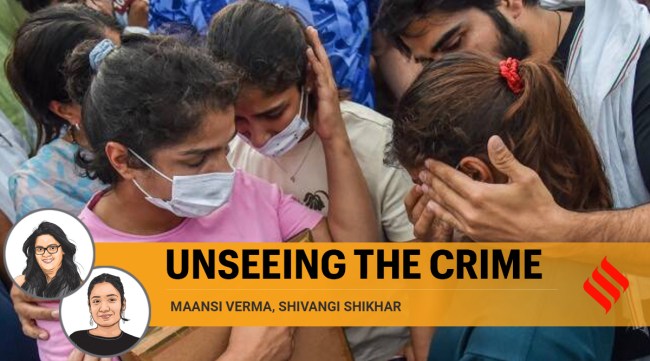Opinion Despite years of alleged abuse by Brij Bhushan Singh, why wrestlers were not believed
The wrestlers' protest has helped shed light on the lapses in the implementation of the prevention of sexual harassment law in sports federations and will hopefully improve these for the better. But they are up against a formidable accused -- a Member of Parliament
 Protesting wrestlers Sakshi Malik, Vinesh Phogat and Sangeeta Phogat at Har ki Pauri ghat, in Haridwar, Tuesday, May 30, 2023. (PTI Photo)
Protesting wrestlers Sakshi Malik, Vinesh Phogat and Sangeeta Phogat at Har ki Pauri ghat, in Haridwar, Tuesday, May 30, 2023. (PTI Photo) Indian society has a chequered history of believing survivors of rape or sexual assault. Mathura in 1972, Bhanwari Devi in 1992, the female employee who alleged sexual assault at the hands of Tarun Tejpal in 2013, the woman staffer who alleged sexual harassment by the then Chief Justice of India, Ranjan Gogoi, in 2019. And now the female wrestlers, who have medalled at various international games, including the Olympics. The revelations from the FIRs filed by them – how the accused, Wrestling Federation of India chief and BJP MP Brij Bhushan Sharan Singh, allegedly harassed, touched, stalked and intimidated the wrestlers — paint a disturbing picture. The wrestlers are among countless, nameless survivors many of whom would have blamed themselves first, then been silenced by their families and ultimately disbelieved when they spoke up.
The reasons for disbelieving a survivor vary. Mathura was held to be “habituated to sexual intercourse” and not resisting her rapists. In Bhanwari Devi’s case, the trial court disbelieved that upper-caste men would defile themselves by raping a lower-caste woman. The survivor in Tejpal’s case was disbelieved by the trial court for not behaving as a survivor of sexual assault should. In all these cases, the women were also up against powerful men, as are the female wrestlers now. It doesn’t come as a surprise, then, that their protests are dismissed by some as politically motivated.
But even as survivors were disbelieved, a movement in their support also started in India. The evolution of victimology in India can be traced back to the Indian feminist movement emerging in 1977 triggered by the Committee on the Status of Women in India’s ‘Towards Equality Report’ (1975). It led to women organising themselves against dowry murders, custodial rape and other issues disproportionately affecting them, calling for reforms in laws as well. The Mathura rape judgment by the Supreme Court was severely criticised and prompted significant amendments to criminal laws in 1983. The Indian Evidence Act was amended to provide that in certain cases of rape where sexual intercourse is proved, which the complainant alleges was without her consent, the courts will have to presume that there was no consent and the burden to prove otherwise would be on the accused.
In 1985, India ratified the Declaration of the Basic Principles of Justice for the Victims of Crime and Abuse of Power, which provides a framework for protecting and promoting the rights of victims to access justice, fair treatment, restitution, compensation and assistance. India also ratified the Declaration on the Elimination of Violence against Women (1993) recognising the need for legal and support services for survivors and raising awareness and changing attitudes that perpetuate violence against women.
The Supreme Court recognised the importance of victim’s rights, victim assistance programmes and support services in its landmark judgement in Zahira Habibullah Sheikh v. State Of Gujarat — the case which dealt with the burning of Best Bakery in Vadodara and the killing of 14 people by a mob during the Gujarat riots of 2002. The initial trial was marred by allegations of a biased investigation and witness intimidation, which violated the right of survivors to a fair and impartial legal process. The Supreme Court has also held in several judgments that the conviction of an accused of sexual assault can be sustained on the sole testimony of the complainant if it inspires confidence. Most recently, this principle was upheld in the case of Phool Singh v. State of Madhya Pradesh in 2021 in which, ironically, the survivor was disbelieved by other women of her family who beat her up after she complained of rape, but the courts relied on her testimony to convict the accused.
The POCSO Act of 2012, enacted to address sexual offences against children, also adopts child-survivor-centric investigation, trial, and rehabilitation measures. Bhanwari Devi’s case led to several women’s rights groups filing a PIL in the Supreme Court. This resulted in the landmark Vishaka v. State of Rajasthan judgment, in which the apex court laid down guidelines to respond to cases of sexual harassment in the workplace. Eventually, Parliament enacted a law in 2013 to prevent and protect women from sexual harassment in workplaces.
The objectives of these measures, however, are far from being achieved. The NCRB’s Crime in India (2021) report reveals that India has a 26.5 per cent conviction rate and a 95 per cent pendency rate in rape cases. According to NFHS-5 (2019-21), about one-third of women have experienced physical or sexual abuse. But, merely 14 per cent either spoke about it or reported it. The reasons for the silence of survivors could be social stigma and shame, fear of retaliation, lack of trust in the justice system, limited awareness and support and family and community pressure. It is not uncommon to find a vocal survivor being subjected to a media trial, vilification on social media, character assassination and unusually harsh scrutiny, at the heart of which are patriarchal notions of disbelieving a woman who stands up to her oppressors. This happened to many survivors who complained of rape and assault during the MeToo movement.
The wrestlers’ protest has helped shed light on the lapses in the implementation of the prevention of sexual harassment law in sports federations and will hopefully improve these for the better, but they are up against a formidable accused, a Member of Parliament. Those who blame the survivors, disbelieve them and make allegations of the “victim card” being played should also take note of the following: The number of Lok Sabha MPs who have declared cases of crime against women sharply increased by 850 per cent from 2009 to 2019. There is now news of a rally of saints and seers from Ayodhya being organised in favour of the accused MP. This is reminiscent of the rally organised in favour of the accused in the case of the brutal gangrape and murder of a minor in Kathua in 2018, attended by ministers from the BJP. The power imbalance between the survivors and the accused couldn’t be starker.
But let this time be different. We, the people, should take a break from our tainted history, believe the survivors, demand the arrest of the accused and let truth and justice reveal themselves.
Verma is a criminal lawyer and Shikhar is a trained social worker. They have worked with child survivors in POCSO cases






